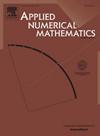Energy stability and error estimate of the RKMK2e scheme for the extended Fisher–Kolmogorov equation
IF 2.2
2区 数学
Q1 MATHEMATICS, APPLIED
引用次数: 0
Abstract
In this paper, we develop a second-order accurate scheme for the extended Fisher–Kolmogorov (EFK) equation and investigate its global-in-time energy stability and convergence. The proposed scheme uses the Fourier spectral collocation method in space and the stabilization Runge–Kutta–Munthe–Kaas-2e (RKMK2e) method for temporal approximation. To demonstrate the global-in-time energy stability of the proposed scheme, we first verify that, under the assumption that all numerical solutions are uniformly bounded, the scheme is energy stable when using a sufficiently large stabilization parameter. Then, to establish the uniform-in-time boundedness of the numerical solutions, we fully utilize the nonlinear operator estimates and discrete Sobolev embedding in each stage of the scheme. Moreover, we conduct an optimal rate convergence analysis with a sufficient regularity assumption for the exact solution. Several numerical examples are presented to validate the accuracy, computational efficiency, and energy stability of the proposed scheme.
扩展Fisher-Kolmogorov方程RKMK2e格式的能量稳定性和误差估计
本文给出了扩展的Fisher-Kolmogorov (EFK)方程的二阶精确格式,并研究了它的全局能量稳定性和收敛性。该方案采用空间傅里叶谱配置法和稳定龙格-库塔-蒙特- kaas -2e (RKMK2e)法进行时间逼近。为了证明所提方案的全局实时能量稳定性,我们首先验证了在所有数值解一致有界的假设下,当使用足够大的稳定参数时,所提方案是能量稳定的。然后,在方案的每个阶段充分利用非线性算子估计和离散Sobolev嵌入来建立数值解的时一致有界性。此外,我们在充分的正则性假设下,对精确解进行了最优速率收敛分析。数值算例验证了该方法的精度、计算效率和能量稳定性。
本文章由计算机程序翻译,如有差异,请以英文原文为准。
求助全文
约1分钟内获得全文
求助全文
来源期刊

Applied Numerical Mathematics
数学-应用数学
CiteScore
5.60
自引率
7.10%
发文量
225
审稿时长
7.2 months
期刊介绍:
The purpose of the journal is to provide a forum for the publication of high quality research and tutorial papers in computational mathematics. In addition to the traditional issues and problems in numerical analysis, the journal also publishes papers describing relevant applications in such fields as physics, fluid dynamics, engineering and other branches of applied science with a computational mathematics component. The journal strives to be flexible in the type of papers it publishes and their format. Equally desirable are:
(i) Full papers, which should be complete and relatively self-contained original contributions with an introduction that can be understood by the broad computational mathematics community. Both rigorous and heuristic styles are acceptable. Of particular interest are papers about new areas of research, in which other than strictly mathematical arguments may be important in establishing a basis for further developments.
(ii) Tutorial review papers, covering some of the important issues in Numerical Mathematics, Scientific Computing and their Applications. The journal will occasionally publish contributions which are larger than the usual format for regular papers.
(iii) Short notes, which present specific new results and techniques in a brief communication.
 求助内容:
求助内容: 应助结果提醒方式:
应助结果提醒方式:


